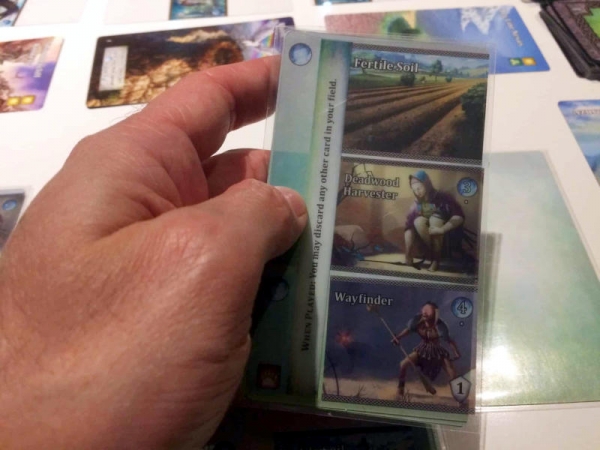I normally don't win, at least not when I play with my games group. That's not a problem and I still have a lot of fun, whatever the outcome. In fact, I sometimes create some extra excitement by not playing it too safe. I actually really like games where you can gamble and create huge point swings. However, I know many people who play to win and who will always play it safe. So in this article, I thought I'd compare the different approaches.
Risk vs Reward
Let's start by looking at the risk-loving player. There will be various levels of risk-taking. I'm the sort of person who quite happily rolls a dice in the hope to get 20 points, rather than taking a guaranteed 5 points, even if the dice roll could result in me losing points. I do this even when I'm in the lead or otherwise, risk losing it all. For some, that's just madness though. I mean, if you're in a desperate situation and basically have nothing to lose and everything to gain, then trusting luck makes sense to most people. However, ruining your chances of victory by relying on the outcome of a flip of a coin, or worse odds for that matter, is just nonsensical to many people.
For me though, it creates excitement. Sure, I could play it safe. I could just plod on and take the guaranteed points and slowly build up my lead. Rolling a dice, drawing a face-down card or otherwise just putting a huge amount of trust in pure chance is so much more exhilarating though. You just have to throw caution out of the window and go for it. If it goes wrong, then so be it. If luck is on your side, then it's amazing. Either way, you'll have created a memorable moment in the game. Especially if the outcome completely changes the game. Losing it all on a dice roll or clinching victory by drawing the perfect card is so much more unforgettable than playing a steady and safe game. Well, at least for me, it's hugely exciting and usually preferable.
Right Time, Right Risk
Experts will tell you that there are specific moments in a game when you should rely on luck. In Mystic Vale, it's sometimes absolutely safe to push, while other times it's complete suicide. So, if you want to win this game, you only push when it's either safe or the risk of spoiling and thereby losing your turn is very low. For example, when your deck has run out and you're going to shuffle your discard and create a new draw deck, then the odds of spoiling are pretty low. That's a good time to push, unless your field already has a good amount of coinage and points in it, of course.
 A card from Mystic Vale
A card from Mystic Vale
If you ask me, then I'll tell you that you should push more. Don't worry, even I know when pushing is completely out of the question, but if the odds are 50:50 or better and there is a good chance that you get the extra money to get the perfect card, then I'd be inclined to draw one more card. That means that my win ratio in Mystic Vale isn't great, but I do have a lot of fun. When I do pull off the perfect push, it feels great.
Similarly, when I play Deep Sea Adventure, I'm the one who will pick up one too many treasures and exhaust the oxygen supply for everyone. At least, on the first dive, but even on the second, it's very tempting to dice with death and try to get an extra tile back to the submarine. When it does work out, it's a great feeling and I win by miles. More often than not though, it doesn't work out and I lose, taking other risk-taking divers with me into the depth of the ocean.
Perfect Safety
So let's talk about the other end of the spectrum. Let's look at avoiding risk at all costs. A lot of games make that impossible, of course. There is always an element of randomness, in the form of dice, cards or similar. All you can do is minimize risk and have something in place that will allow you to mitigate bad luck, at least to some degree.
Of course, finding a way of being able to take risks while having the option to cancel unfavourable dice results or card draws can be very interesting. I do actually try that myself in some games. It offers me the excitement of taking risks, without the bad effects when things go wrong. It's a good halfway house.
However, some people don't even want to go there. They won't even bother with risk mitigation, if they can avoid randomness altogether. They want a steady income of points or focus on their engine and slowly ramp up point production. Trying to find the best strategy and refining it is their thing. Analytical players like learning how a game works and how points are created. Randomness and risk just get in their way. Being able to formulate an efficient winning strategy on their first play is bliss for them and that's great.
At the end of the day, everyone has to find their way of enjoying games. It's great if the same game can offer people with different interests similar levels of fun and satisfaction. Not many games can achieve that, of course, because offering something for everyone isn't easy and often leads to mediocre games. However, as long as everyone around the table has a good time, it doesn't matter whether you like risk or hate it.
What About You?
So what about you? How do you feel about risk? Do you like dice rolls or card draws? Or do you prefer if there is some level of mitigation? Maybe you don't like any risk at all and just want to focus on winning in a reliable fashion. As always, please share your thoughts and experiences in the comments below. I'm sure there are many different attitudes to risk and randomness in games.
 Games
Games How to resolve AdBlock issue?
How to resolve AdBlock issue? 




















